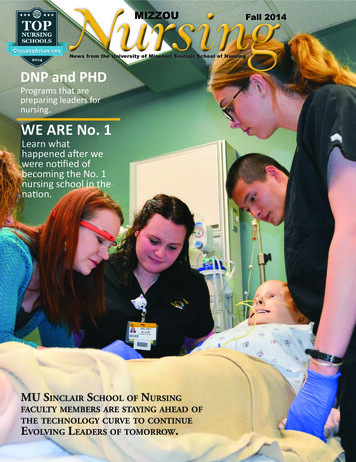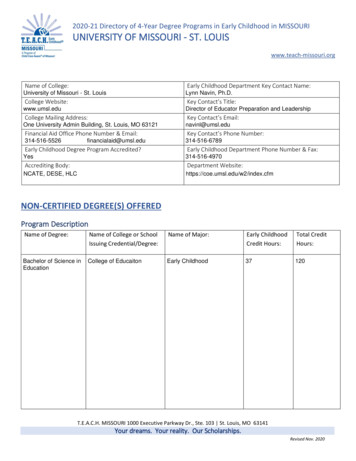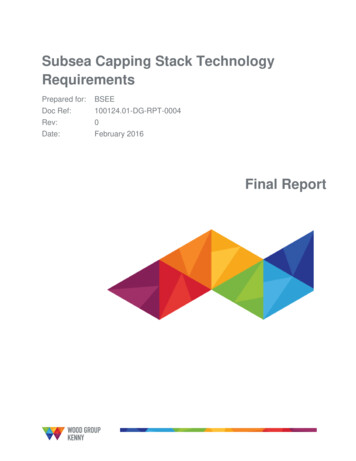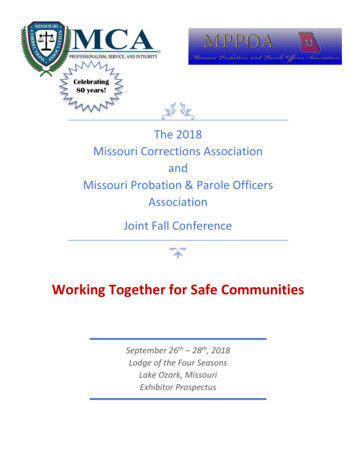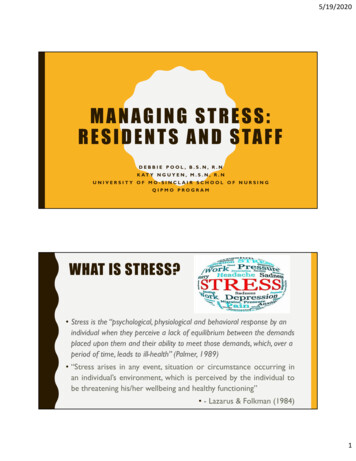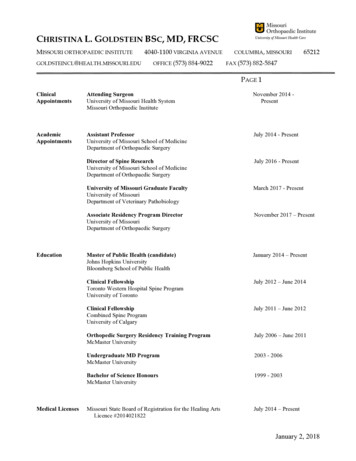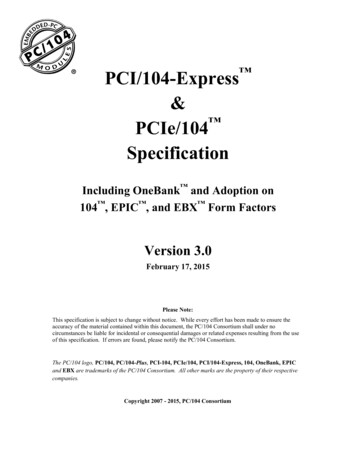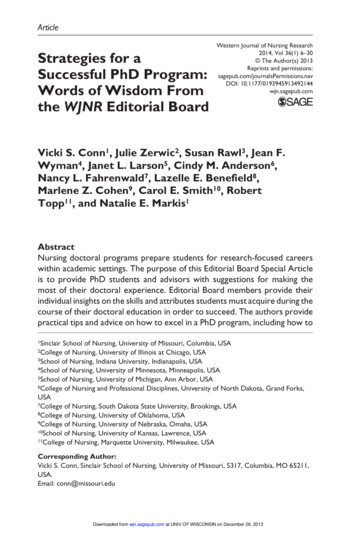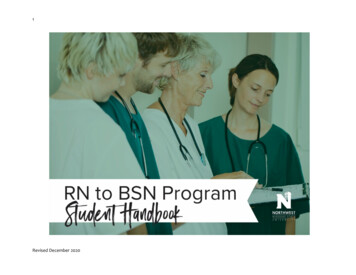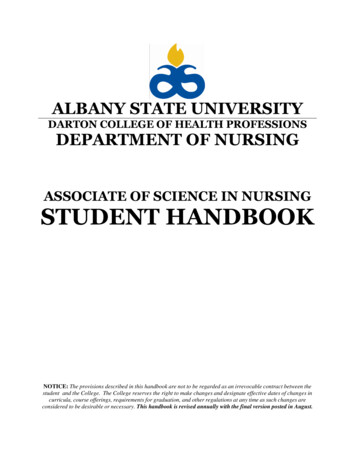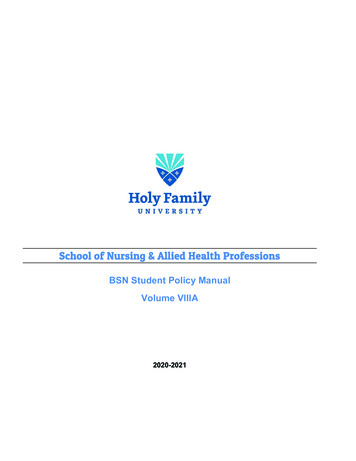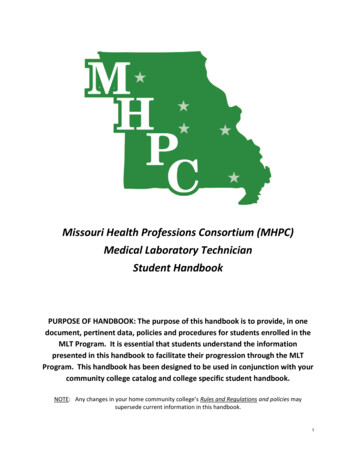
Transcription
Missouri Health Professions Consortium (MHPC)Medical Laboratory TechnicianStudent HandbookPURPOSE OF HANDBOOK: The purpose of this handbook is to provide, in onedocument, pertinent data, policies and procedures for students enrolled in theMLT Program. It is essential that students understand the informationpresented in this handbook to facilitate their progression through the MLTProgram. This handbook has been designed to be used in conjunction with yourcommunity college catalog and college specific student handbook.NOTE: Any changes in your home community college’s Rules and Regulations and policies maysupersede current information in this handbook.1
Missouri Health Professions Consortium (MHPC)Medical Laboratory Technician Student HandbookTable of ContentsPAGEGENERAL INFORMATIONHistory and Overview of MHPC . 6MHPC Organizational Structure . 7Faculty and Staff Contact Information and Faculty Qualifications . 8MLT PROGRAM INFORMATIONProgram Mission Statement, Philosophy and Outcomes . 10Educational Program Description . 11Curriculum. 12Course Descriptions . 13Credit Hour Distribution . 14Tuition & Fee Guidelines. 15Estimated Costs. 16Course Registration . 17Academic Calendar Dates . 17Program Completion Criteria and Certification . 17Professional Development Opportunities and Memberships . 18American Society for Clinical Laboratory Sciences (ASCLS) . 18Class Representative . 18National Board of Certification (ASCP-BOC) . 18Accreditation . 19Americans with Disabilities Act. 20Notice of Non-Discrimination . 20COMMUNICATIONSFaculty Office Hours and Mandatory Check-Ins . 22Departmental Meetings . 22“Home Campus” Advisement . 22MLT Program Professional Year Advisement . 22Program Communications . 23Email . 23Cell Phone and Texting . . . 232
Canvas . 23Website 23SAFETYUniversal Precautions and Infection Control . 25Exposure Procedure . 26Hepatitis B Vaccination Policy. 28Safety Regulations . 28Safety Equipment . 30First Aid . 30ACADEMIC STANDARDSProfessional Ethical and Academic Standards . 33Academic Preparation and Performance Expectations . 34Essential Qualifications Requirements . 35Attendance. 37Grading. 38Honor Roll . 39Incomplete Policy . 39Phlebotomy Credit by Examination . 39Examination Proctors . 39Progression, Remediation and Retention Criteria . 40Academic Dishonesty . 40HIPAA . 42Academic Grievance and Appeals. 43Probationary Status . 44Dismissal from Program . 44Readmission . 44GUIDELINES AND REQUIREMENTS FOR CLINICAL ROTATIONS ANDSTUDENT LABORATORY SESSIONSClinical Rotation and Student Laboratory Overview . 47Student Laboratory . 47Clinicals . 47Practicums. 47MediaLab/LabCE Examinations . . . 48Rotation Policies . 48Site Assignments . 483
Clinical Rotation and Practicum Site Availability/Cancellation. 49Absences . 49Malpractice and Professional Liability Insurance . 49Employment During the Rotations . 50Confidentiality. 50Code of Ethics . 50Communication with the MLT Program Director . 50Grading. 50When a Problem Occurs During Rotations . 51Student Laboratory, Clinical or Practicum Remediation Process . 52Failure or Withdrawal from a Rotation. 52Students with Accommodations . 53Medical Insurance and CPR Training . 53Release of Information . 53Professionalism and Student Expectations. 53Professional Appearance . 54Qualification Requirements for the MHPC MLT Program . 55Confidentiality Agreement . 55Immunizations . 55Drug Screen . 55Criminal Background Checks . 55ACADEMIC FORMSRecord of Academic Violation . 57Record of HIPAA Violation . 58Remediation Contract . 59PROGRAM FORMS AND DOCUMENTSBlood Borne Pathogen Exposure Incident Report Form. 63Release of Information . 64Confidentiality Agreement. 65Information Resources. 66Qualification Requirements Compliance Verification . 67Professionalism Contract . 68Handbook Signature Page. 69Agreement to Protector Exams .704
GeneralInformation5
History and Overview of MHPCMissouri Health Professions ConsortiumCooperative Colleges:East Central College, Union, MissouriMoberly Area Community College, Moberly, MissouriNorth Central Missouri College, Trenton, MissouriState Fair Community College, Sedalia, MissouriState Technical College of Missouri, Linn, MissouriThree Rivers College, Poplar Bluff, MissouriUniversity of Missouri, Columbia, MissouriCommunity colleges from across the State of Missouri along with the University of Missouri haveformed a consortium to offer an innovative Medical Laboratory Technician (MLT) Program.Graduates of the MLT Program will obtain an Associate of Applied Science Degree in MedicalLaboratory Technician from one of the community colleges. Each student admitted to the MLTProgram will select only one “home” campus from the community colleges offering theprogram of study, including: East Central College, Union, MOMineral Area College, Park Hills, MOMoberly Area Community College, Mexico CampusState Fair Community College, Sedalia, MOThree Rivers College, Poplar Bluff, MONorth Central Missouri College, Trenton, MO6
MHPC MLT Organizational Structure1. Governing Board -- The Consortium will be managed under the authority of a GoverningBoard of Directors comprised of the presidents from each member community college andrepresentatives of the University of Missouri in Columbia as outlined in relatedMemorandums of Understanding.2. Home Campus - Each student admitted to a Consortium program will select one “home”campus from among the member community colleges offering the program of study. Theadmitted student is expected to enroll and pay tuition and fees directly to the “home”campus. Admitted students may be required to travel to other approved site(s) to attendassigned practice laboratory and clinical training. Once a student completes all programrequirements, the “home” campus shall grant and confer the student’s certificate/degree,and these outcomes shall be counted and reported in accountability measures such asgraduation rates, retention rates, and other institutional assessments.7
Faculty and Staff Contact InformationAnd Faculty QualificationsAlese M. Thompson, MS, MLS (ASCP)CMMHPC MLT Program Executive DirectorClinical InstructorM.S., University of North DakotaB.S., Saint Louis UniversityContact Information:2900 Doreli LaneMexico, Missouri 65265573-582-0817 ext. 13624aleset@macc.eduTyler Lero, MPH, MLS (ASCP)Clinical InstructorM.P.H., University of Missouri-ColumbiaB.S., University of Missouri-Columbia2900 Doreli LaneMexico, Missouri 65265lerot@health.missouri.eduDarinda Mast, MLT (ASCP)CMClinical InstructorAAS in Medical Laboratory Technician, MACCKimberly Schrader M(ASCP)CM, MHAClinical InstructorM.H.A., William Woods UniversityB.S., Lincoln UniversityB.S., University of Missouri-ColumbiaKasey Edwardson, MPH, MLS(ASCP)CM,SCCMClinical InstructorP.H.d., Ed Leadership, University of Nebraska, LincolnM.P.H., University of Nebraska Medical CenterB.A., Health Sciences, Bellville UniversityAAS in Medical Laboratory Technician, Southeast CCJordan Elliot Richards, MLS(ASCP)CMClinical InstructorB.S., University of MissouriTanna WhitworthAdministrative AssistantAA, General Education, MACC2900 Doreli LaneMexico, Missouri 65265darindamast@macc.edu2900 Doreli LaneMexico, Missouri 65265kimberlyschrader@macc.edu2900 Doreli LaneMexico, Missouri 65265kaseye@macc.edu2900 Doreli LaneMexico, Missouri 65265jordanrichards@macc.edu2900 Doreli LaneMexico, Missouri, 65265573-582-0817 ext. 13656tannaw@macc.edu8
MLTProgramInformation9
Program Mission Statement, Philosophy and OutcomesIn keeping with the mission of the Missouri Health Professions Consortium (MHPC), the MedicalLaboratory Technician program was developed to meet the increasing demand for highly competentmedical laboratory technicians in rural and underserved areas of Missouri. The purpose of this associatedegree program is to prepare selected individuals to provide accurate and reliable diagnostic testingresults to the citizens of Missouri. We educate and prepare laboratory generalists, to have theknowledge, skills and professional behaviors that are necessary to be eligible to apply for the nationalcertification examination as well as meet employer expectations in the community service area.The MHPC Associate of Applied Science degree in Medical Laboratory Technicianprogram aligns exceptionally well with the “service region” mission of each ofthe participating Consortium colleges, in following ways: Is intended to improve the quality of life of Missourians through teaching,discovery, and service. Is highly collaborative and emphasizes high quality, rigorous instruction. Addresses Missouri’s critical need for medical laboratory technicians inthe immediate and long term, and will enhance the health of Missouriansby increasing the health workforce and providing education in an area ofhigh demand for traditional and non-traditional students. Is anticipated that the vast majority of this program’s graduates willcontinue to live and work in the same communities from which they weretrained, thereby extending the positive benefits of the program.Program Outcomes1. Demonstrate knowledge of laboratory professional practice by providing safe, effectiveand accurate laboratory test results while maintaining patient confidentiality.2. Utilize established laboratory procedures taking into consideration the application ofscientific principles, technical skills for operation and maintenance of laboratoryequipment, and relationship of laboratory findings to disease states to ensureappropriate patient diagnosis and treatment.3. Employs professional conduct and communication skills with patients, families,laboratory personnel, healthcare team members, and the community as a medicallaboratory technician.4. Participate in professional development activities valuing the importance of continuouslearning in laboratory medicine.5. Comply with Federal, OSHA, and laboratory safety procedures for the well-being of thepatient, healthcare team, self and community.10
Educational Program Description:Missouri Health Profession’s Consortium Medical Laboratory Technician program prepares thegraduate to assume responsibility in various laboratory settings, medical or non-medical,clinical diagnostic or research, hospital or reference laboratories.The MLT program culminates in an Associate of Applied Science degree. All potential studentsmust take the prescribed general education classes, which ideally can be completed in twosemesters. Medical Laboratory Technician courses may only be taken after students havesuccessfully completed prerequisite courses. Completion of the MLT-specific courses will taketwo semesters and one summer.Core classes in this program study human diseases and laboratory tests that identify them.Students learn to operate equipment in medical laboratories and perform a wide range ofprocedures. Didactic and clinical instruction emphasize proper specimen collection andhandling, understanding test procedures, safety, quality control, acquisition of technical skills,and troubleshooting techniques. To successfully complete an MLT course, students must score 78% or “C” in both the didactic and clinical components.When students have successfully completed the Medical Laboratory Technician program, theywill be eligible to take the American Society for Clinical Pathology certification examination.Granting the degree is not contingent on passing the registry examination.The curriculum includes the following: Orientation Training in phlebotomy Lecture (didactic) in various disciplines of laboratory science Practical training in the student laboratory Individual rotations through clinical departments of clinical affiliates Written and practical examinations throughout the curriculum11
MHPC MLT ProgramAssociate of Applied Science Degree Program of StudyCurriculumTotal Credits:General Education Requirements:Professional Requirements:60-6125-26 (minimum of 25% of total credits)35YEAR 1General Education RequirementsCoursesHuman Anatomy w/Lab (or Anatomy and Physiology I)Physiology w/Lab (or Anatomy and Physiology II)English Composition IMathematics RequirementUS History or Government, Constitution RequirementGeneral Chemistry IDirected ElectivesYEAR 2Professional RequirementsSemester 1: August-DecemberMLT 150 Introduction to Laboratory Science MethodsMLT 210 ImmunologyMLT 250 Hematology and CoagulationMLT 260 PhlebotomyMLT 291 Hematology and Coagulation PracticumSemester 2: January-MayMLT 270 ImmunohematologyMLT 294 Immunohematology PracticumMLT 280 Clinical MicrobiologyMLT 290 Parasitology, Mycology and VirologyMLT 293 Clinical Microbiology PracticumCredit Hours4433353-4Total: 25-26Credit Hours2352252412Total: 14Semester 3: June – AugustMLT 220 Clinical Chemistry and UrinalysisMLT 292 Clinical Chemistry PracticumTotal: 1452Total: 712
Course Descriptions– MLT Program YearMLT 150: Introduction to Laboratory Science Methods- 2 credits (2 lecture)This course orients the student to the concepts encompassed in the laboratory environment, to include safe specimen handling, testingprocedures, reporting results, basic quality control, laboratory organization and professionalism. Prerequisite: Admission into the MHPCMLT Program; successful completion of required general education pre-requisite courses, grade of “C” or better; minimum cumulativeGPA of 2.5; successful completion of each course during each semester required in the MHPC MLT program, grade of “C” or better.MLT 210: Immunology- 3 credits (2 lecture; 1 Lab/Clinical)The course consists of the principles and theories of antigen and antibody reactions and the immune system as related to diagnosticserologic procedures. Prerequisite: Admission into the MHPC MLT Program; successful completion of required general education prerequisite courses, grade of “C” or better; minimum cumulative GPA of 2.5; successful completion of each course during each semesterrequired in the MHPC MLT program, grade of “C” or better.MLT 260: Phlebotomy- 2 credits (1 lecture; 1 Lab/Clinical)This course covers various procedures in performing venipuncture and other specialized collection techniques in addition to laws andregulations for safe phlebotomy practices. Prerequisite: IF IN MLT PROGRAM: Admission into the MHPC MLT Program; successfulcompletion of required general education pre-requisite courses, grade of “C” or better; minimum cumulative GPA of 2.5; successfulcompletion of each course during each semester required in the MHPC MLT program, grade of “C” or better.MLT 250: Hematology and Coagulation- 5 credits (4 lecture; 1 Lab/Clinical)This course studies the cellular structures in blood, normal and abnormal cell development, alterations present in disease and themechanisms of coagulation. Prerequisite: Admission into the MHPC MLT Program; successful completion of required general educationpre-requisite courses, grade of “C” or better; minimum cumulative GPA of 2.5; successful completion of each course during eachsemester required in the MHPC MLT program, grade of “C” or better.MLT 280: Clinical Microbiology- 4 credits (3 lecture; 1 Lab/Clinical)This course consists of the role of pathogenic bacteria and other microorganisms which will include bacterial culturing, differentiation andidentification of human normal flora and disease-causing microorganisms. Prerequisite: Admission into the MHPC MLT Program;successful completion of required general education pre-requisite courses, grade of “C” or better; minimum cumulative GPA of 2.5;successful completion of each course during each semester required in the MHPC MLT program, grade of “C” or better.MLT 290: Parasitology, Mycology, Virology- 1 credit (1 lecture)This course introduces the student to parasites, fungus and viruses and their role in human health and disease. Prerequisite: Admissioninto the MHPC MLT Program; successful completion of required general education pre-requisite courses, grade of “C” or better; minimumcumulative GPA of 2.5; successful completion of each course during each semester required in the MHPC MLT program, grade of “C” orbetter.MLT 270: Immunohematology- 5 credits (4 lecture; 1 Lab/Clinical)This course consists of concepts, applications and discrepancies of blood group testing, screening and crossmatch procedures andidentifying unexpected antibodies. Prerequisite: Admission into the MHPC MLT Program; successful completion of required generaleducation pre-requisite courses, grade of “C” or better; minimum cumulative GPA of 2.5; successful completion of each course duringeach semester required in the MHPC MLT program, grade of “C” or better.MLT 220: Clinical Chemistry and Urinalysis- 5 credits (4 lecture; 1 Lab/Clinical)This course introduces the student to methods of analysis of chemical components found in the human body, the testing methodologiesfor those constituents and the results as applied to normal and abnormal disease states. Prerequisite: Admission into the MHPC MLTProgram; successful completion of required general education pre-requisite courses, grade of “C” or better; minimum cumulative GPA of2.5; successful completion of each course during each semester required in the MHPC MLT program, grade of “C” or better.MLT 291: Hematology and Coagulation Practicum- 2 credits (2 Lab/Clinical)Supervised clinical practice coordinated by the Consortium, in the hematology lab of selected clinical affiliates. Prerequisite: Admissioninto the MHPC MLT Program; successful completion of required general education pre-requisite courses, grade of “C” or better; minimumcumulative GPA of 2.5; successful completion of each course during each semester required in the MHPC MLT program, grade of “C” orbetter.MLT: 292: Clinical Chemistry Practicum- 2 credits (2 Lab/Clinical)Supervised clinical practice coordinated by the Consortium, in the clinical chemistry lab of selected clinical affiliates. Prerequisite:Admission into the MHPC MLT Program; successful completion of required general education pre-requisite courses, grade of “C” orbetter; minimum cumulative GPA of 2.5; successful completion of each course during each semester required in the MHPC MLT program,grade of “C” or better.MLT 293: Clinical Microbiology Practicum- 2 credits (2 Lab/Clinical)Supervised clinical practice coordinated by the Consortium, in the microbiology lab of selected clinical affiliates. Prerequisite: Admissioninto the MHPC MLT Program; successful completion of required general education pre-requisite courses, grade of “C” or better; minimumcumulative GPA of 2.5; successful completion of each course during each semester required in the MHPC MLT program, grade of “C” orbetter.MLT 294: Immunohematology Practicum- 2 credits (2 Lab/Clinical)Supervised clinical practice coordinated by the Consortium, in the immunohematology lab of selected clinical affiliates. Prerequisite:Admission into the MHPC MLT Program; successful completion of required general education pre-requisite courses, grade of “C” orbetter; minimum cumulative GPA of 2.5; successful completion of each course during each semester required in the MHPC MLT program,grade of “C” or better.13
Credit Hour DistributionLecture/Lab/Clinical Hours per Semester1 semester 16 weeks instruction1 credit hour lecture 15 contact hours1 credit hour lab/clinical 60 contact MLT 150 Introduction to Laboratory Science Methods2300030MLT 210 Immunology23016090MLT 250 Hematology and Coagulation460160120MLT 260 Phlebotomy11516075MLT 291 Hematology and Coagulation Practicum00212012091355300435460160120CoursesTOTAL SEMESTER 1:MLT 270 ImmunohematologyMLT 294 Immunohematology Practicum002120120MLT 280 Clinical Microbiology34516095MLT 293 Clinical Microbiology Practicum002120120MLT 290 Parasitology, Mycology and Virology115001581206360470460160120TOTAL SEMESTER 2:MLT 220 Clinical Chemistry and UrinalysisMLT 292 Clinical Chemistry PracticumTOTAL SEMESTER 3:TOTAL PROGRAM:00212012046031802402131514840114514
Tuition and Fees GuidelinesMHPC MLT Program StudentsPolicy: Tuition and Fees policies for the MHPC MLT Consortium Program are consistent with policies andprocedures established by the participating Consortium colleges. It is the duty of the MHPC MLT ProgramExecutive Director and MHPC Governing Board of Directors to ensure ongoing continuity and consistencybetween campuses within a reasonable degree of variation.The following guidelines are intended to assist students in addressing general tuition and fees related topayment and financial aid.General:1. Students will be billed for all tuition and fees through the home campus registrars and cashiers asestablished by community college specific policies and procedures.2. Students matriculated into the Consortium program will enroll at the student’s “home campus”community college, and will pay the required tuition and fees to the home campus.3. All pre-requisite general education and science coursework taken prior to a student’s formaladmission to the Consortium program shall be paid in the same manner as other native studentsattending the home community college campus.Financial Aid:1. It is generally understood that once admitted to the Consortium program, students are countedand reported as students of the “home” community college. This process shall determine thestudent “home-campus” for federal and state financial aid eligibility and account service. It is theintent of this Consortium agreement that all financial aid services shall be provided by the localmember community college.Non-Curricular Student Activities and Events:1. Students accepted into a Consortium program will be afforded the same access rights to noncurricular events and activities as those afforded to other currently enrolled native studentson the “home campus”. This understanding will enable these students to participate incommunity college intercollegiate athletics, student activities and organizations, use therecreation facilities, library, residence halls, etc. All appropriate fees will be covered by thetuition/fees charged by the “home” member Consortium community college.15
Estimated Student Program Costs for Professional YearTuition and Fees for the MHPC MLT Program professional year (MLT coursework) will be higher thangeneral education costs at the home campus. This is an estimate of student costs associated with theprogram, including tuition, books, supplies, immunizations, training/certifications.MLT Admissions Expenses (due in the summer semester, upon acceptance to the MLT Program)Background Screening11 panel drug screenStudent Membership Dues for American Society for Clinical Laboratory Science (ASCLS)Physical Examination (cost is estimated and varies depending on healthcare provider/insurance coverage)Immunizations – (cost is estimated and varies depending on healthcare provider/insurance coverage):Tetanus/diphtheria (Tdap) within past 10 years; MMR series; Hepatitis B series; Varicella vaccination series ortiter indicating immunity; annual flu shot; annual TB ScreeningSupplies (scrubs, nametag, appropriate shoes, etc)Sub-Total, MLT AdmissionsVariesVaries25.00150.00*500.00*300.00 975.00*Semester 1 (FALL, 16-weeks)Tuition and Fees @ 14 credit hours/5 classes (paid directly to home campus)Books - estimated cost (paid to campus bookstore or ordered online)Media Lab/Lab CE ExamSub-Total, Fall4,410.00500.0075.00 4,985.00Sub-Total, Spring4,410.00500.00 4,910.00Sub-Total, Summer2,205.00215.00 2,420.00TOTAL Estimated Professional Year Cost 13,290.00Semester 2 (SPRING, 16-weeks)Tuition and Fees @ 14 credit hours/5 classes (paid directly to home campus)Books - estimated (paid to campus bookstore or ordered online)Semester 3 (SUMMER, 8-weeks)Tuition and Fees @ 7 credit hours/2 classes (paid directly to home campus)Certification Examination- ASCP-BOC fees*These are cost estimates t
Medical Laboratory Technician Program . Title: Auditing a Class . Policy #207 . Date: 6/14/18 . Purpose: To identify students’ ability to audit an MHPC MLT class. Policy: A non-degree seeking student has the ability to audit an MLT course mainly for purposes of review before a national
